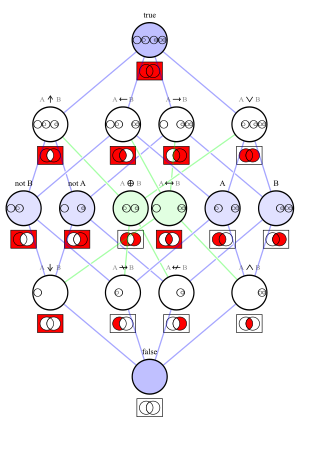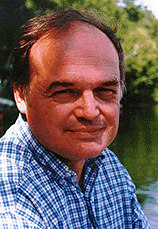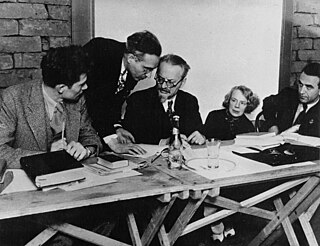Related Research Articles

Edmund Gustav Albrecht Husserl was an Austrian-German philosopher and mathematician who established the school of phenomenology.

In logic, a logical connective is a logical constant. Connectives can be used to connect logical formulas. For instance in the syntax of propositional logic, the binary connective can be used to join the two atomic formulas and , rendering the complex formula .
Philosophy of mathematics is the branch of philosophy that deals with the nature of mathematics and its relationship with other human activities.

Friedrich Ludwig Gottlob Frege was a German philosopher, logician, and mathematician. He was a mathematics professor at the University of Jena, and is understood by many to be the father of analytic philosophy, concentrating on the philosophy of language, logic, and mathematics. Though he was largely ignored during his lifetime, Giuseppe Peano (1858–1932), Bertrand Russell (1872–1970), and, to some extent, Ludwig Wittgenstein (1889–1951) introduced his work to later generations of philosophers. Frege is widely considered to be the greatest logician since Aristotle, and one of the most profound philosophers of mathematics ever.
Classical logic or Frege–Russell logic is the intensively studied and most widely used class of deductive logic. Classical logic has had much influence on analytic philosophy.
The history of logic deals with the study of the development of the science of valid inference (logic). Formal logics developed in ancient times in India, China, and Greece. Greek methods, particularly Aristotelian logic as found in the Organon, found wide application and acceptance in Western science and mathematics for millennia. The Stoics, especially Chrysippus, began the development of predicate logic.
Analytic philosophy is a broad, contemporary movement or tradition within Western philosophy, especially anglophone philosophy, focused on analysis. Analytic philosophy is characterized by a clarity of prose; rigor in arguments; and making use of formal logic and mathematics, and, to a lesser degree, the natural sciences. It is further characterized by an interest in language and meaning known as the linguistic turn. It has developed several new branches of philosophy and logic, notably philosophy of language, philosophy of mathematics, philosophy of science, modern predicate logic and mathematical logic.

Metamathematics is the study of mathematics itself using mathematical methods. This study produces metatheories, which are mathematical theories about other mathematical theories. Emphasis on metamathematics owes itself to David Hilbert's attempt to secure the foundations of mathematics in the early part of the 20th century. Metamathematics provides "a rigorous mathematical technique for investigating a great variety of foundation problems for mathematics and logic". An important feature of metamathematics is its emphasis on differentiating between reasoning from inside a system and from outside a system. An informal illustration of this is categorizing the proposition "2+2=4" as belonging to mathematics while categorizing the proposition "'2+2=4' is valid" as belonging to metamathematics.

George Stephen Boolos was an American philosopher and a mathematical logician who taught at the Massachusetts Institute of Technology.

Begriffsschrift is a book on logic by Gottlob Frege, published in 1879, and the formal system set out in that book.

Jean Louis Maxime van Heijenoort was a historian of mathematical logic. He was also a personal secretary to Leon Trotsky from 1932 to 1939, and an American Trotskyist until 1947.
Michael David Resnik is a leading contemporary American philosopher of mathematics.
Psychologism is a family of philosophical positions, according to which certain psychological facts, laws, or entities play a central role in grounding or explaining certain non-psychological facts, laws, or entities. The word was coined by Johann Eduard Erdmann as Psychologismus, being translated into English as psychologism.
The Latin term characteristica universalis, commonly interpreted as universal characteristic, or universal character in English, is a universal and formal language imagined by Gottfried Leibniz able to express mathematical, scientific, and metaphysical concepts. Leibniz thus hoped to create a language usable within the framework of a universal logical calculation or calculus ratiocinator.
The history of logic as a subject has been characterised by many disputes over what the topic deals with, and the main article 'Logic' has as a result been hesitant to commit to a particular definition of logic. This article surveys various definitions of the subject that have appeared over the centuries through to modern times, and puts them in context as reflecting rival conceptions of the subject.
In metalogic and metamathematics, Frege's theorem is a metatheorem that states that the Peano axioms of arithmetic can be derived in second-order logic from Hume's principle. It was first proven, informally, by Gottlob Frege in his 1884 Die Grundlagen der Arithmetik and proven more formally in his 1893 Grundgesetze der Arithmetik I. The theorem was re-discovered by Crispin Wright in the early 1980s and has since been the focus of significant work. It is at the core of the philosophy of mathematics known as neo-logicism.
In mathematical logic, the ancestral relation of a binary relation R is its transitive closure, however defined in a different way, see below.
This is a list of articles in analytic philosophy.
Patricia A. Blanchette is an American philosopher and logician, the McMahon-Hank Professor of Philosophy at the University of Notre Dame. She specializes in the history of philosophy, history of logic, philosophy of logic, philosophy of mathematics, and philosophy of science, and is the author of a book on the logic of Gottlob Frege.
References
- ↑ "Danielle Macbeth : Biographical Sketch". Haverford College. Retrieved 25 February 2016.
- ↑ Macbeth, Danielle. Frege's Logic. Cambridge, MA: Harvard UP, 2005. Print.
- ↑ Macbeth, Danielle. Realizing Reason: A Narrative of Truth and Knowing. N.p.: n.p., n.d. Print.